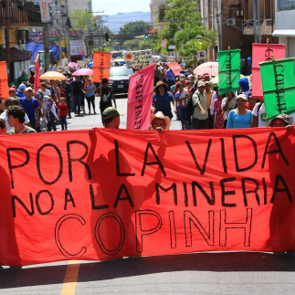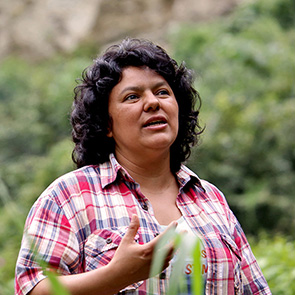One Month After Berta's Killing, Her Fight Continues
On 3 March 2016, a group of men broke into Berta Cáceres' home in Intibucá, Honduras and murdered her.
One month later, the killers - and those who sent them - are still at large.
Berta was a Lenca indigenous woman. For 20 years, she defended the territory and rights of the Lenca people, leading campaigns and protests against megaprojects that violated the land and environmental rights of local communities. In 1993 she co-founded Consejo Cívico de Organizaciones Indígenas Populares – COPINH (Civic Council of Popular Indigenous Organisations), which, under her leadership, successfully prevented multimillion dollar corporations from decimating indigenous land. Berta was a force with which to be reckoned. The strength of her spirit and her activism in the face of fatal risks earned her international human rights awards a near cult-like following in environment rights circles. Her killing sparked outrage around the world and local human rights defenders from other countries are demanding justice for Berta.
Despite international pressure and the protests of Berta's family and friends, the Honduran government has not opened an independent and transparent investigation into the case.
It has not granted effective protection measures to Berta's colleagues, COPINH member who report ongoing harassment, intimidation and death threats. The Honduran government is not moving to protect the rights of indigenous communities in Honduras and the land on which they live.
According to COPINH and Berta's family, the government's current investigation into her killing is deeply flawed. The crime scene was altered and the autopsy of her body was performed without the presence of an independent forensic doctor.
The only witness to the killing, Mexican human rights defender Gustavo Castro, was no offered protection. Authorities did not provide him with medical assistance following Berta's killing. When he tried to leave Honduras because of fear of another attack, the police detained him at the airport and ordered him to stay in the country, despite the high risk he was facing. Only on 31 March, almost one month later, authorities notified Gustavo that he was now allowed to leave Honduras.
The police officers who questioned Gustavo showed him photos of other COPINH's members and asked him if the killer was one of them. The prosecutors summoned and interrogated eight coordinating members of COPINH. Nobody from the hydroeletric company - that Berta and her community were opposing in relation to the Agua Zarca hydroeletric project - was interrogated.
The fact that human rights defenders are targeted and treated as criminals come to no surprise. Berta herself faced judicial harassment because of her work. In 2013 she was arrested on false charges of “illegal possession of a firearm endangering the security of the Honduran state,” usurpation of land, and coercion. She was also charged with causing more than $3 million in damages to DESA, a hydroelectric dam company.
As Honduras criminalises human rights defenders, impunity for those who threaten, attack and kill HRDs is rampant. Less than two weeks after Berta's killing, another member of COPINH – Nelson Garcia – was murdered. No investigation was launched after his murder, and local, government controlled media hardly mentioned his killing. Berta's family and colleagues are largely shut out of the "investigations" in her killings, and continue to receive information about the case from news reports rather than from the Honduran authorities.
On a website dedicated to keep Berta's memory alive, her family published a list of requests for the Honduran government and the international community:
- Launch an independent, international investigation, possibly cooperating with the Inter-American Commission on Human Rights (IACHR)
- Allow the Guatemalan Anthropological Forensics Foundation to analyse the forensic evidence
- Ensure the genuine protection of Berta's family, members of COPINH, and the main witness Gustavo Castro
- Stop providing assistance to Honduran security forces while activists like Berta continue to be murdered in impunity.
- Development banks should suspend funding to Honduran private sector, as there is no mechanism to prevent gross human rights violations in the country.
- Withdraw the “Tigres” unit (a militarized police unit trained by the US) from Río Blanco, the site of a proposed dam strongly opposed by the local indigenous community
- End paramilitary training and activity supported by foreign governments.
- End the persecution of those who defend the rights of indigenous peoples and of the entire society.
The government is yet to respond to these requests, but it is clear that Berta's fight did not die on the night of her killing. In an open letter, Gustavo Castro wrote:
“I saw Berta dying in my arms, but I also saw her heart in each struggle that COPINH has embraced, and in all the people who had the opportunity to meet her. Berta's killing might have given many companies the opportunity to exploit her territory. Yet, COPINH is stronger than ever and it will need solidarity from everyone. We all have to join their struggle and keep Berta's memory in our hands”.
Hundreds of people from other human rights organisations, unionists, women's groups, indigenous communities and students have joined the protests organised by COPINH. They have shown solidarity and added their voices to COPINH's call for justice.
In an article for the Huffinton Post, Karen Spring, coordinator of the Honduras Solidarity Network, wrote:
Banners, posters, graffiti and the energy projected by hundreds of people in the streets are all signs of how inspirational my friend Berta was. All around Tegucigalpa, her face has been spray-painted next to the words, Berta did not die. She multiplied.
As well as demanding justice for Berta's killings, human rights defenders across the world have joined COPINH in calling for the suspension of the Agua Zarca project. Built on the Gualcarque river, the Agua Zarca is a cascade of four hydroelectric dams. The project, which has the potential to restrict access to water for the indigenous people who live in the region, was initiated without consent of local communities or proper consultations with them.
Following Nelson Garcia's murder, both FMO (the Dutch development bank) and Finnfund announced they were immediately suspending all activities in Honduras. On 1 April, news broke that the Central American Bank for Economic Integration, which loaned $24.4 million to the company managing the project, Desarollos Energeticos S.A. (DESA), was suspending funding for the Agua Zarca. DESA itself has not stopped the megaproject. Berta's families and friends have vowed to continue organising protests and advocacy activities until the dams are abandoned.
Front Line Defenders expresses its solidarity with Berta's family and members of COPINH, and joins them in urging the Honduran authorities to launch an independet investigation into Berta Caceres' killing. Front Line Defenders also express further concern at the ongoing harassment and intimidation faced by COPINH members and other human rights defenders in Honduran, and calls on the authorities to provide them with adequate protection.


